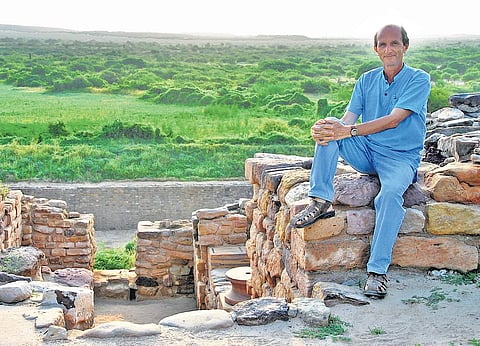

Author Michel Danino talks to Medha Dutta about his recent book Sri Aurobindo and India’s Rebirth.
Tell us about the book.
Sri Aurobindo is regarded as a thinker, poet, philosopher and spiritual master, but his vision of India is poorly known—the country’s foundations, accomplishments, potential, ‘destiny’ (a word that often comes under his pen), mission in the world, but also her supreme challenges. This book covers some six decades of his writings, speeches, notes, talks and letters to disciples, in an attempt to convey the richness of that vision, its evolution in time, and something of its power.
Are Sri Aurobindo’s thoughts relevant today?
If not, such an anthology would only have historical value. In my opinion, Sri Aurobindo’s remarks on the errors India should avoid both in her struggle for freedom, and the lasting foundations she should build on afterwards, are particularly rich in lessons for today.
Do you think he was right in doubting Gandhi’s method to attain freedom and insistence on Ahimsa?
He was not the only one to think so; historians such as R C Majumdar shared this scepticism. A whole decade before Gandhi’s return to India, Sri Aurobindo was one of the architects in Bengal of what he called ‘the doctrine of Passive Resistance’, which included the boycott of British goods, Swadeshi, national education, etc. However, he also regarded the use of force, if appropriate and with a reasonable chance of success, as perfectly legitimate. To him, Gandhi’s stand on Ahimsa was dogmatic and often counter-productive. It will take some time before we have a comprehensive and dispassionate assessment of how much the end of the colonial rule owes to Ahimsa.
Could we achieve the India of his vision?
Like many leading figures and freedom fighters of his time, Sri Aurobindo wanted India to stand on her own legs and not on post-colonial crutches. Yet Independent India hardly altered the political, judicial, bureaucratic or educational systems she inherited. Some of his political and social thoughts offer alternatives.
You have been in India for a while now. How has it changed over the years?
The outer change is obvious, both for good and bad; the ‘inner’ change is harder to gauge: intellectual hypocrisy and self-contempt have grown by leaps and bounds, but genuine (and often silent) attempts, through individuals or institutions alike, to rediscover what made Indian civilisation tick for five millenniums, to ask the right questions (can the past help our future?), have also multiplied.
What is that one thing that India has taught you?
Not one but many; trust, patience, detachment (keep trying but never expect results), a healthy sense of insignificance but also of a divine hand behind appearances.
Are we as a nation letting go of our cultural roots?
As a modern nation, did we ever bother about them? Almost nothing of them is to be found in our curricula and textbooks, for instance; or how much is reflected in our ‘culture’ of corruption or our crass neglect of the environment? Indeed, the worst failure is to believe that culture is fine for museums, puja rooms or perhaps weddings, while it is to be lived in every day’s small gestures and choices—if not, it is a dead culture.
Do you think our leaders today need to go back to Sri Aurobindo?
How many would feel such a need at all? In every party, most are quite content wallowing in the present decayed system, as long as they can extract privileges from it.
What are you working on next?
An old karma revisited: a fresh study of the Aryan issue. Something different, I hope, showing the lack of rigour in that old debate (or ‘non-debate’, rather). The focus will ultimately be on the genesis of Indian civilisation.